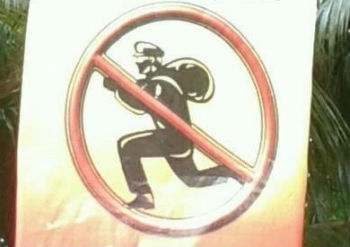A major rise in lynchings in Venezuela last year reflects the degradation of a country in multi-layered turmoil.
Sixty-five lynchings occurred in Venezuela as of September 2016, according to official data obtained off the record by InSight Crime. (See graph below) In contrast, only ten lynchings were recorded in 2015, according to reports from the Ministry of Internal Affairs, Justice and Peace.
Until 2015, lynchings had only occurred sporadically in rural or suburban areas, representing little concern for the government. However, after civilian groups and organized communities had killed 26 people across the country by April 2016, Attorney General Luisa Ortega Días raised his concerns with lynchings.
Authorities have blamed widespread anger and inadequate measures against insecurity as the primary factors contributing to the wave of lynchings last year.
SEE ALSO: Venezuela News and Profiles
The case of 42-year-old chef Roberto Fuentes Bernal, who was lynched and burned in Los Ruices de Caracas by residents of the community who confused him for a criminal, garnered widespread attention after the events were recorded and broadcast on social media.
A 23-year-old man was arrested for his part in initiating the lynching. However, afterwards the Supreme Court followed up with a ruling that banned the disclosure of audiovisual content in lynching cases.
The majority of lynchings came after the attorney general’s April announcement.

The Ministry of the Interior confirmed the Attorney General’s Office reports of ten total lynchings for 2015. However, private consultants have reported much higher totals. What’s more, for every deadly lynching, there are three additional cases where death is avoided due to timely police intervention.
Lynchings have occurred in 13 of Venezuela’s 24 states with Monagas (20), Miranda (9), Zulia (7) and Carabobo (7) recording the highest numbers of reported lynchings.
InSight Crime Analysis
Venezuela’s perennial issues of high homicide rates and impunity, mixed with a political and economic crisis, appear to have created a toxic cocktail where justice is sometimes sub-contracted to the masses.
Depending on who you ask, the homicide rate is anywhere between 59 and 91 per 100,000 inhabitants. The government of Nicolás Maduro has been incapable of dealing with crime and violence, especially since it entered a tailspin due to flagging oil prices and the near constant devaluation of its currency.
Lynchings fit into this context. They appear to be a form of “popular justice” that relies on overt or covert approval by vast sectors of the Venezuelan population. Occasional actions by the Attorney General’s Office to prosecute those carrying out the lynchings appear to have little effect.
Nationwide investigations into the lynchings illustrate that lynchings are seen as a form of extrajudicial law. According to Freddy Crespo, a criminologist and professor at the University of the Andes in Mérida, who conducted one of these investigations, “Lynchings are not perceived as homicides, but rather as retaliatory justice.”
SEE ALSO: Coverage of Vigilantes
Police officers who try to thwart lynchings are thought to be aiding the criminals and are looked down upon by the community. Crespo adds that lynchings are a regressive tendency in Venezuelan society towards a “primal state.”
Roberto Briceño León, director of the Venezuelan Observatory of Violence, agrees. He says nearly 66 percent of the population approves of the lynchings as an expedited way of carrying out justice.
As a result of growing impunity in Venezuela, citizens are resorting to alternative methods of bringing criminals to justice. According to figures from the Attorney General’s Office, there’s a 98 percent rate of impunity in lynching cases and a 92 percent rate of impunity for homicides.
Increased discontent has lead to the formation of vigilante groups inside communities in Caracas as well. These groups often post warnings throughout the communities of what will happen to criminals if they are arrested by the groups.

